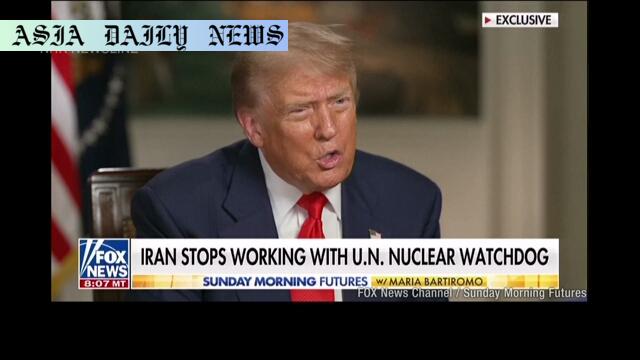Iran sanctions could be lifted if they respond positively, says Trump.
US President Trump claims Iran sanctions may be reconsidered.
Trump highlights the success of recent strikes on Iran’s nuclear facilities.
Sanctions relief depends on Iran ceasing nuclear activity and refraining from harm.
US media suggests the strikes may have set Iran’s nuclear program back just months.

Overview of Trump’s Message on Iran Sanctions
In a significant remark during his recent interview on Fox News, US President Donald Trump conveyed a dual-edged message to Iran. He suggested that while Iran’s nuclear capabilities have been drastically targeted and diminished through US military action, there remains a possibility for diplomatic reprieve. Trump emphasized that US strikes have obliterated Iran’s key nuclear facilities, rendering them incapable of transporting enriched uranium before the attack. However, he opened avenues for potential lifting of economic sanctions if Iran demonstrates peaceful intentions.
The Extent of Impact on Iran’s Nuclear Facilities
Trump claimed unparalleled success from the military operations, expressing that Iran’s nuclear achievements were “obliterated like nobody’s ever seen before.” However, despite these statements, early assessments from some US media outlets present a more modest analysis. Reports suggest that the setback to Iran’s nuclear program may extend to just a few months. This disparity raises questions about the broader strategic goals of the strikes: are they meant purely as temporary deterrents, or do they aim to bring Iran to the negotiating table?
Trump’s Conditions for Lifting Sanctions
Sanctions relief remains a key bargaining chip for the US. Trump’s commentary reflects his administration’s strategy to pressure Tehran into halting its nuclear developments entirely. “If they can be peaceful, and if they can show us they’re not going to do any more harm,” Trump remarked, indicating the US administration’s readiness to incentivize compliance. The President’s goal appears to weave a delicate balance of military might and diplomatic outreach to compel Iran into making permanent concessions.
Global Reactions and Broader Implications
The global community is watching closely as these events unfold. Iran’s diplomatic positioning—whether it accords to US demands or retaliates—will have massive implications for regional stability in the Middle East. Economic sanctions, which have weighed heavily on Iran’s economy, remain a critical pivot point that could either escalate tensions or open new doors for negotiation. Meanwhile, US allies and adversaries alike are assessing the effectiveness and repercussions of such power plays in maintaining a geopolitical balance.
Conclusion
In summary, Trump’s comments have underscored a potent combination of military assertiveness and diplomatic flexibility. While the recent strikes have sent a stark message, the potential for rehabilitative measures, such as sanctions relief, paints a possibility of cooperation. It now remains to be seen if Iran will seize this chance to avoid further economic strain and geopolitical isolation. For the US, the challenge lies in maintaining a firm yet adaptable strategy as it unfolds its vision of peace and security in a highly volatile region.



Commentary
Understanding the US Strategy on Iran Sanctions
The recent developments between the US and Iran highlight a pivotal moment in global geopolitics. President Trump’s approach seems to emphasize a carefully orchestrated mix of force and diplomacy. On one hand, his administration’s military action has indeed demonstrated a resolve to prevent Iran from pursuing nuclear ambitions. Yet, the offer to lift sanctions upon Iran’s compliance signifies a willingness to engage diplomatically. This duality is intriguing because it reflects the complexities of dealing with a nation that has long resisted international pressure while also grappling with its own internal and external constraints.
Evaluating the Effectiveness of the Strikes
While President Trump’s strong statements on the obliteration of Iran’s nuclear capabilities are striking, reports suggesting only a temporary setback raise questions about the efficacy of such operations. If the ultimate goal is to eliminate nuclear threats permanently, can military interventions alone achieve this without sustainable diplomatic agreements? This opens the debate on whether such actions are designed merely as a show of force or as part of a broader strategy to bring Iran to the negotiating table. The balance between demonstrations of power and meaningful negotiations is a tightrope the US will have to walk carefully.
The Importance of Sanctions Relief as a Bargaining Tool
Sanctions relief stands out as one of the most significant levers in this entire equation. The effectiveness of sanctions is undeniable—they have caused significant economic hardship in Iran, putting pressure on its leadership to reconsider its nuclear ambitions. However, offering to lift sanctions also underscores a willingness to reward compliance. This aspect of the US strategy could be instrumental in shaping Iran’s next moves. By incentivizing peaceful behavior, the US can potentially foster long-term stability in the Middle East.
Broader Implications for Regional and Global Politics
The US-Iran standoff is more than a bilateral issue; it is a test case for how nations navigate power dynamics and respond to international pressure. Allies and adversaries alike are likely to draw lessons from this scenario, which could influence their own policies and alignments. Furthermore, the resolution—or escalation—of this conflict could either contribute to regional peace or exacerbate tensions in a volatile Middle East. For the global community, this is a moment to consider the importance of multilateral efforts in addressing nuclear threats and promoting security.
Conclusion
As the situation unfolds, it is clear that the stakes are exceptionally high. The interplay between military action, sanctions, and diplomacy will define not only the future of US-Iran relations but also the broader trajectory of peace and conflict in the region. While Trump’s approach has its critics, it also presents opportunities for recalibrating international relations and fostering dialogue. The coming months will undoubtedly be critical in determining whether this delicate balance yields stability or further discord.